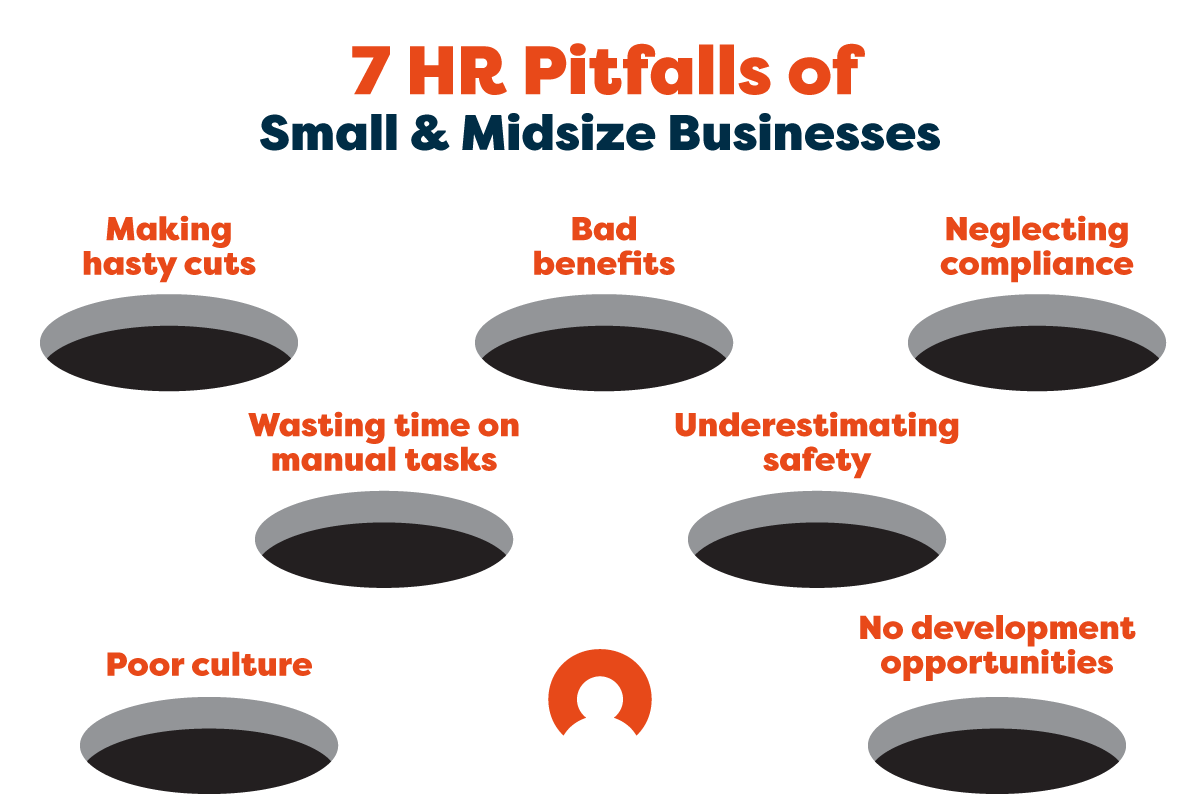Managing HR can be a maze — especially for small and mid-sized businesses (SMBs). Fortunately, a Professional Employer Organization (PEO) can help SMBs avoid common pitfalls. Let’s dive into the top HR mistakes SMBs make and how a PEO partnership can turn these challenges into opportunities for success.

1. Making too many cuts during economic uncertainty
In times of economic volatility, some SMBs may make quick, reactionary decisions—like delaying hiring or halting employee training—without considering long-term effects. Making too many cuts or delays can destabilize the business, harming operations and morale. Employees may feel insecure, resulting in disengagement or turnover. When economic conditions improve, SMBs that made impulsive cuts may struggle to recover, putting them at a disadvantage against more stable competitors.
How a PEO can help
PEOs offer stability by providing consistent support and insights for your HR needs. They can help identify smart ways to reduce costs without sacrificing employee benefits or talent acquisition, allowing SMBs to stay competitive even during economic downturns.
2. Assuming you can't afford competitive benefits
Many SMBs assume they cannot offer benefits like comprehensive healthcare, dental, or retirement plans. But without competitive benefits, businesses often experience high turnover rates and struggle to attract new talent. Constantly hiring and training new employees drives up costs and lowers productivity, while remaining employees may feel undervalued.
How a PEO can help
By partnering with a PEO, SMBs can access Fortune-500-level benefits through pooled resources, making it possible to offer healthcare, dental, vision, and retirement plans that would otherwise be unaffordable. This helps SMBs retain their best employees and attract top talent.
3. Neglecting compliance
Employment laws are complex and change frequently. SMBs that don’t stay updated on regulations—such as new family leave policies or classification rules—risk non-compliance, which can result in severe financial and legal repercussions. For example, a business that inadvertently misclassifies employees could face back pay obligations and penalties, leading to costly disputes and potential damage to its reputation.
How a PEO can help
PEOs provide dedicated experts who stay current on employment laws, ensuring your business remains compliant. By monitoring and implementing necessary changes, PEOs help SMBs avoid costly fines and legal complications.
4. Underestimating workplace safety
Without structured safety protocols, SMBs are more vulnerable to accidents. This not only puts your employees at risk, but it will result in higher workers’ comp premiums. Beyond the financial impact, unsafe working conditions can hurt employee morale, damage the company’s reputation, and open the business to legal liabilities.
How a PEO can help
PEOs can help SMBs develop workplace safety policies and risk mitigation plans, reducing the likelihood of workplace accidents and associated costs. They also take on much of the liability, handling payroll taxes and employee benefits, further reducing your exposure to potential risks.
5. Wasting time on easily automated HR tasks
In most SMBs, employees manually handle tasks like payroll, attendance, and benefits administration. Not only does manual entry waste time, but it also increases the risk of error, which can harm employee satisfaction and productivity.
How a PEO can help
A PEO offers access to advanced HR technology that automates key functions like payroll, onboarding, and benefits management. These tools streamline daily operations and reduce manual work, freeing your team to focus on core business objectives.
6. Undervaluing workplace culture
SMBs often overlook the importance of a positive work culture. Without structured initiatives for employee engagement, mental health support, or diversity and inclusion, employees may feel unappreciated or disconnected. In a competitive job market, this can make it difficult to attract new talent.
How a PEO can help
PEOs support culture-building through programs that prioritize employee well-being, such as mental health resources, engagement initiatives, and diversity training. These resources strengthen the work culture, boost morale, and foster loyalty, making your business a more attractive place to work.
7. Overlooking professional development opportunities
In a competitive job market, offering professional development is essential for employee retention. However, SMBs often lack the budget or resources to implement training programs, leading to lower employee engagement and growth potential.
How a PEO can help
PEOs frequently offer access to training and development resources that help employees improve their skills and advance their careers. This includes access to soft-skills coaching for rising managers or industry-specific training for individual contributors.
/240320_PRO-114.jpg?width=1200&height=675&name=240320_PRO-114.jpg) Leverage a PEO to avoid HR pitfalls
Leverage a PEO to avoid HR pitfalls
Working with a PEO is a cost-effective way to help small and midsize businesses avoid HR mistakes. By taking on compliance, benefits, and administrative responsibilities, a PEO enables SMBs to focus on strategic growth and innovation.
If you’re ready to explore the transformative benefits of PEO services, contact PRO Resources today and learn how we can help optimize your HR operations.

/shutterstock_443931046.jpg?width=1200&height=630&name=shutterstock_443931046.jpg)